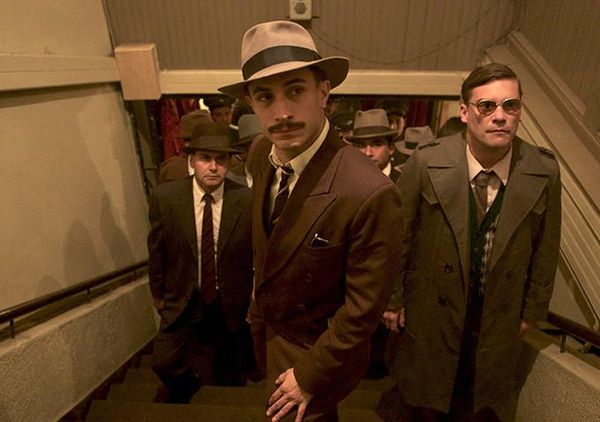Eye For Film >> Movies >> Neruda (2016) Film Review

Chilean film director Pablo Larraín made two biopics in 2016. One is Jackie, which is in English and will win lots of awards. The other is Neruda, which is in Spanish and won't, but is by far the superior work.
Pablo Neruda was not a man; he was a legend. There once was a man, named Ricardo Eliécer Neftalí Reyes Basoalto, a politician and diplomat who served Chile's Communist Party, but when he chose to write poetry, to adopt that new title, it swiftly consumed him, his old identity fading even in the eyes of those close to him. By the time it became clear that the man faced danger at the hands of Gabriel González Videla's troubled regime, the legend had grown to proportions that made it difficult to distinguish the real from the fictional, the speaker from the speech.

Larraín's film is a tapestry of carefully researched real events, with sets and costumes recreated in painstaking detail, and romantic imaginings which provide a surreal take on events and hint at the emotional impact of his work on both his supporters and his foes. One character blurs the lines between the two: the detective Óscar Peluchonneau (Gael García Bernal), who becomes increasingly obsessed with the poet-politician as he tries to track him down, and who gradually comes to believe that he is only a character in one of Neruda' tale. As plot threads gradually, deliberately unravel and the story is stripped down to the bone, Peluchonneau and Neruda seem to slip in and out of one another's dreams, bound by a love, a humour and a sense of inescapable tragedy that sum up what it meant to be Chilean in this troubled time.
Gabriel García Márquez was awed by Neruda; although he is beginning to be celebrated on the same level, even Larraín might have hesitated to take on this project, which could succeed only by establishing its own elegiac status. One wonders if the sense of awe and nervousness conveyed by some of its minor characters reflects his own feelings, yet the parts are assembled into a confident whole, a triumphant piece of filmmaking. Whether in the complex landscape of the poet's home, where every item tells a story, or out in the snowy wasteland of Patagonia where life hangs by a thread, Larraín's framing directs the viewer to ask questions. The focus remains on the characters but there's a sense that nothing in their surroundings can be taken for granted, and by placing them within that visual landscape, Larraín also places Neruda at the heart of the cultural milieu that helps explain both his value and the threat he represent.
Luis Gnecco is perfect in the title role, charismatic but understated, capable of captivating others with his speech but not too good looking, so we never make the mistake of interpreting the feelings he inspires as simple lust. There is always a sense that he could dominate any scene in which he appears, yet he rarely does, letting us see Neruda's power in the fact that he need prove nothing. Opposite him, García Bernal presents a tortured romantic hero out of place and out of time, and painfully aware of it. Though ostensibly the hunter, Peluchonneau seems hunted and haunted throughout, embodying the emotion that Neruda contains and channels through words. Mercedes Morán delivers a poignant yet never bitter performance as Neruda's partner Delia del Carril, recognising at the outset that she is sidelined, their relationship never able to compete with that between writer and character.
Which of these men is going to his doom? What of Larraín himself, and writer Guillermo Calderón? There is always more to the story. Like a good poem or a well written political speech, the film is open to many interpretations. It takes the viewer on a journey into a labyrinth.
Reviewed on: 21 Jan 2017
















